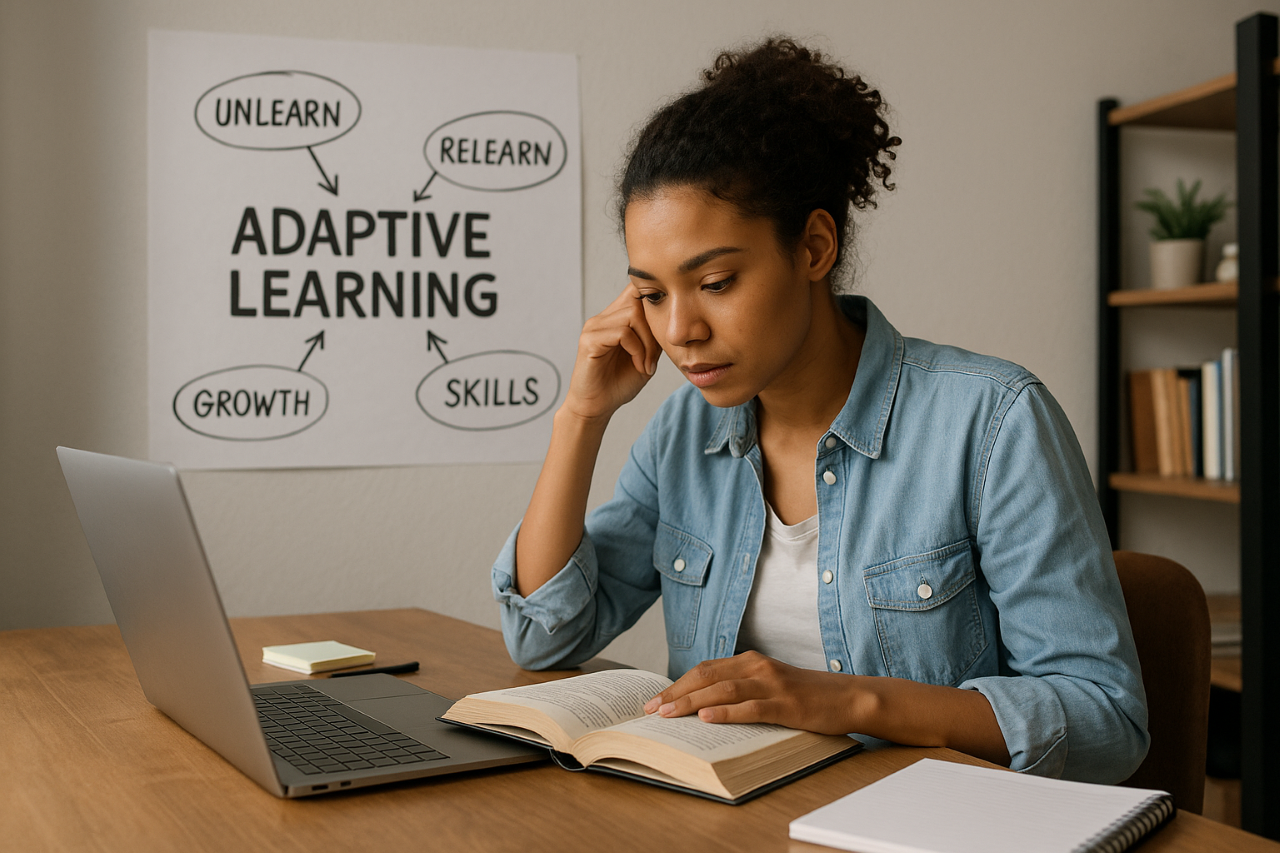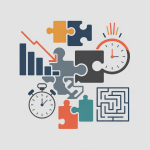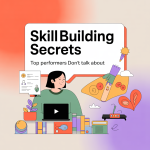
The most important skill of our times is adaptive learning — the ability to learn, unlearn, and relearn continuously in response to changing environments, technologies, and expectations.
Here’s why:
🔄 1. The World is Changing Faster Than Ever
-
Technology, especially AI, is reshaping how we live and work.
-
Job roles and required skills are evolving rapidly.
-
Lifelong learning is no longer optional — it’s survival.
🧠 2. Knowledge has a Shorter Shelf Life
-
What you learned in school may already be outdated.
-
Being able to discard outdated assumptions and acquire new frameworks is vital.
💡 3. It Enables All Other Key Skills
-
Want to be good at critical thinking? You have to practice and adapt.
-
Want to master AI tools, communication, leadership, or resilience? You need to be constantly learning.
📱 4. It Keeps You Relevant
-
Whether you’re a student, employee, entrepreneur, or retiree, the ability to learn what’s next — and let go of what’s obsolete — keeps you valuable and confident.
⚙️ 5. It’s Human-Centric
-
Unlike narrow technical skills that can be automated, adaptive learning taps into curiosity, creativity, and emotional intelligence — things machines still struggle to replicate.
Supporting skills include:
-
Digital literacy
-
Critical thinking
-
Emotional intelligence
-
Communication
-
Collaboration
-
But without adaptive learning, they stagnate.
ChatGPT said:
Cultivating adaptive learning in yourself is about building the mental flexibility, habits, and mindset to thrive amid change. Here’s a practical, structured approach:
🔁 1. Adopt a Growth Mindset
Believe you can learn and improve — that intelligence and ability are not fixed.
How:
-
Replace “I can’t do this” with “I can’t do this yet.”
-
Celebrate effort, not just outcomes.
-
Reflect on failures as data, not defeat.
📚 2. Design a Personal Learning System
Don’t leave learning to chance. Make it a habit.
How:
-
Schedule learning time (15–30 minutes daily or weekly sprints).
-
Use diverse sources: books, podcasts, online courses, communities, and mentors.
-
Track what you’ve learned with a simple journal, blog, or note-taking app (e.g., Notion or Obsidian).
🔍 3. Get Good at Meta-Learning
Learn how you learn best — and improve it.
How:
-
Discover your optimal learning format (audio, visual, hands-on, social).
-
Practice “active recall” (e.g., flashcards, quizzes, teaching others).
-
Use the Feynman Technique: explain a concept in simple terms.
🧠 4. Strengthen Mental Flexibility
Adaptive learners are not rigid — they reframe, retool, and refocus.
How:
-
Regularly ask: “What might I be wrong about?”
-
Try learning opposing viewpoints to challenge your beliefs.
-
Use analogies from unrelated fields to spark new perspectives.
🛠️ 5. Develop Transferable Skills
Focus on skills that can move across industries or life roles.
Examples:
-
Problem solving
-
Communication
-
Systems thinking
-
Emotional regulation
-
AI tool fluency
-
Time management
Practice applying them in new contexts — not just where you’re already comfortable.
🔄 6. Practice Intentional Unlearning
Don’t let outdated habits, assumptions, or skills weigh you down.
How:
-
Ask yourself: What’s no longer serving me?
-
Seek feedback — especially the kind that makes you uncomfortable.
-
When tech or ideas shift, let go of “the old way” with curiosity, not resistance.
🌱 7. Put Yourself in the Stretch Zone
Growth lives between boredom and overwhelm.
How:
-
Take on projects that challenge you (but are still within reach).
-
Volunteer for roles that force you to grow.
-
Try “learning sprints” — focused 2-week challenges with clear goals.
🧭 8. Reflect Often
Learning sticks when it’s integrated through reflection.
How:
-
Use weekly questions:
-
What did I learn?
-
What surprised me?
-
What will I do differently?
-
-
Keep a “Lessons Learned” document — even short bullet lists matter.
Bonus: Tools That Help
-
Books: Ultralearning by Scott Young, Mindset by Carol Dweck
-
Apps: Blinkist, Readwise, Notion, Anki
-
Courses: LinkedIn Learning, Coursera, MasterClass
-
Communities: Reddit, local learning clubs, mastermind groups
📅 30-Day Adaptive Learning Challenge
Each activity takes 15–30 minutes, unless noted otherwise.
🔹 WEEK 1: Foundation – Build Your Mindset
| Day | Task |
|---|---|
| 1 | Take a mindset snapshot: Write down how you currently approach learning. What excites you? What frustrates you? |
| 2 | Watch a short video on the Growth Mindset (e.g., Carol Dweck TED Talk). Reflect: Where in life are you fixed-minded? |
| 3 | List 3 recent failures or challenges and what they taught you. |
| 4 | Set a learning goal: “By Day 30, I want to understand/practice ____.” |
| 5 | Read an article or chapter from a book outside your usual interests. Jot down 3 insights. |
| 6 | Try a learning style quiz (like VARK) and note how it matches your experience. |
| 7 | Journal: “What do I believe about my ability to learn hard things?” |
🔹 WEEK 2: Systems – Learn How to Learn
| Day | Task |
|---|---|
| 8 | Identify your “learning slots” – where 15–30 minutes can reliably fit each day. |
| 9 | Learn the Feynman Technique. Pick a concept and try to explain it simply. |
| 10 | Explore a spaced repetition app (e.g., Anki) and try creating 5 flashcards. |
| 11 | Sign up for a free micro-course (Coursera, LinkedIn Learning, etc.) in your target skill. |
| 12 | Practice “deliberate learning” for 25 min: No distractions, set goal, reflect. |
| 13 | Create a “Learning Dashboard” in a notebook, Notion, or Google Doc to track insights. |
| 14 | Reflect: “What have I learned about how I learn this week?” |
🔹 WEEK 3: Agility – Embrace Change & Complexity
| Day | Task |
|---|---|
| 15 | Read a viewpoint you strongly disagree with and write 3 things it gets right. |
| 16 | Try something new for the first time: a tool, a podcast, a physical skill. Note what you had to unlearn. |
| 17 | Watch a short explainer on AI, blockchain, or another tech trend. Summarize it in 3 sentences. |
| 18 | Ask someone to teach you something they know well. Pay attention to how they teach and how you absorb. |
| 19 | Do a “mental cross-training” task: solve a puzzle, play chess, or learn a brain teaser. |
| 20 | Write down 3 beliefs or habits you might need to rethink in the next 5 years. |
| 21 | Reflect: “Where did I feel resistance this week? What might it be teaching me?” |
🔹 WEEK 4: Integration – Apply & Expand
| Day | Task |
|---|---|
| 22 | Apply something you’ve learned this month to a real-life problem or decision. |
| 23 | Teach a friend or family member one new concept you’ve learned. |
| 24 | Create a 10-slide mini-presentation or 1-page summary of your learning journey. |
| 25 | Explore a skill completely outside your profession (e.g., photography, coding, gardening). |
| 26 | Do a “reverse mentoring” conversation — ask someone younger what they’re learning and why. |
| 27 | Choose 1 thing to unlearn — a belief, workflow, or routine that no longer fits. |
| 28 | Write: “What am I most proud of learning this month?” Share it with someone. |
| 29 | Choose your next 30-day goal. What skill, tool, or topic will you focus on next? |
| 30 | Celebrate! Reflect: “How have I changed as a learner this month?” |


